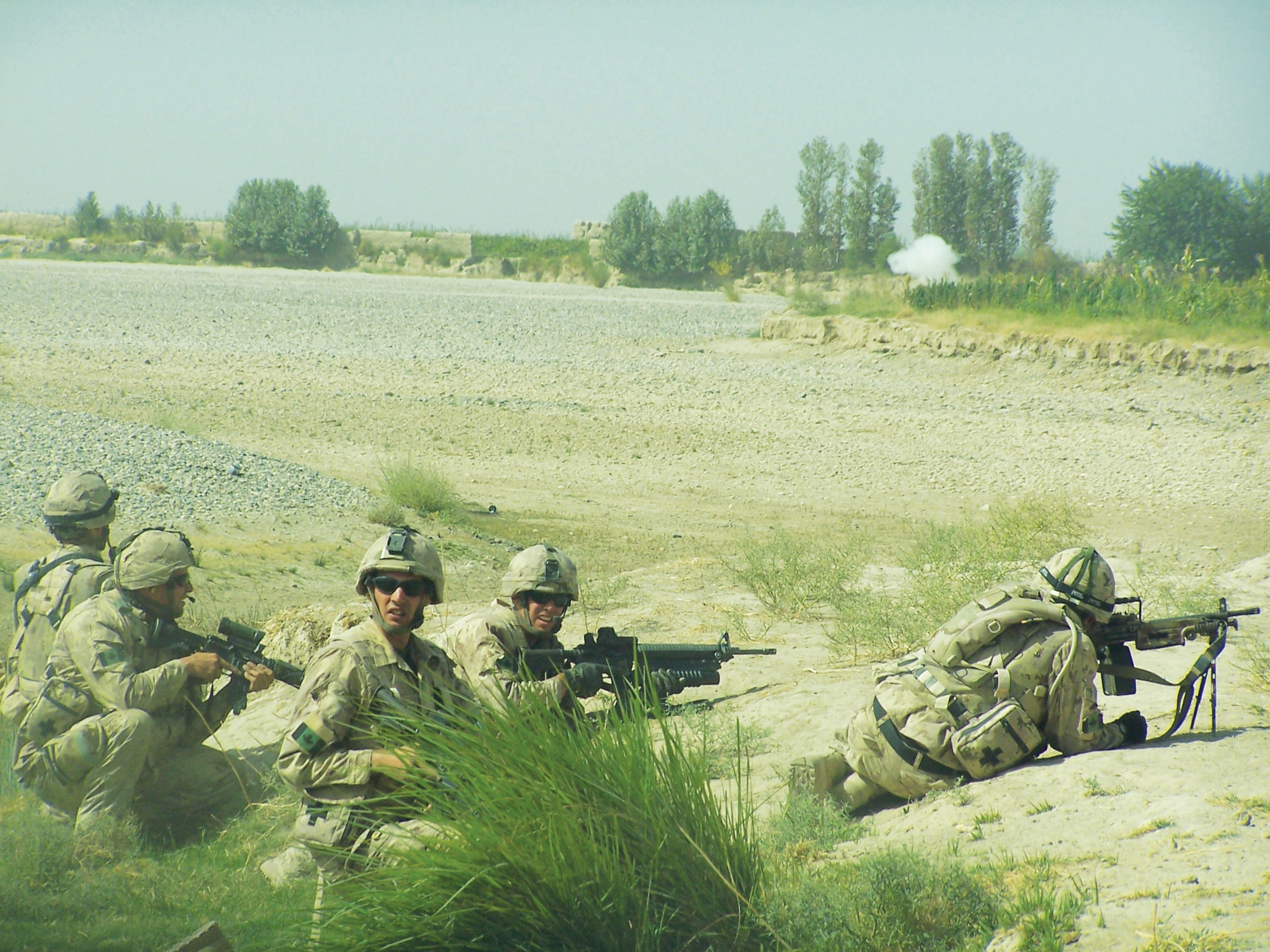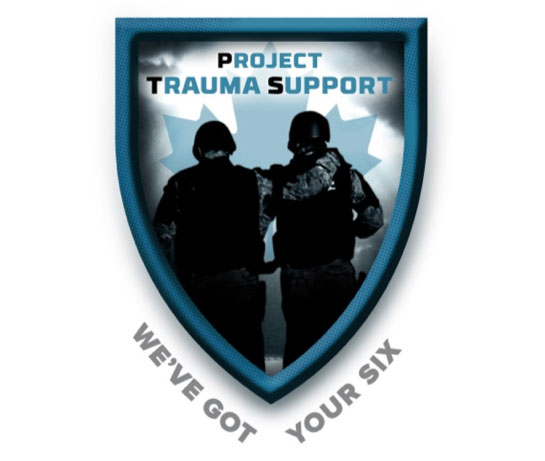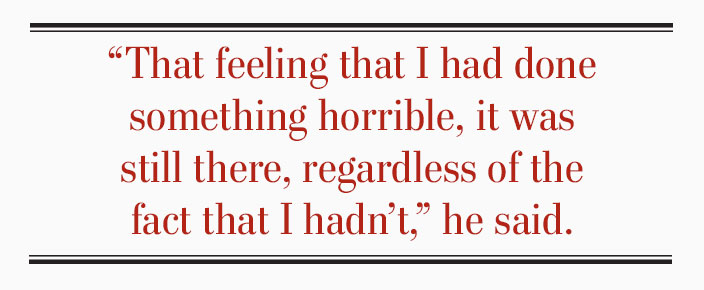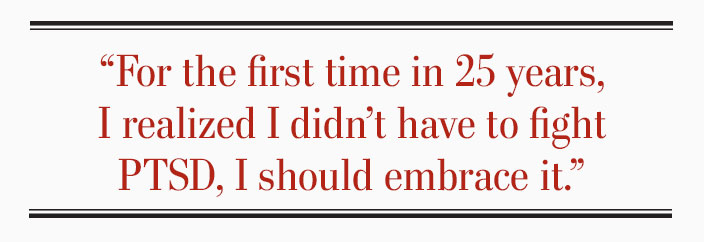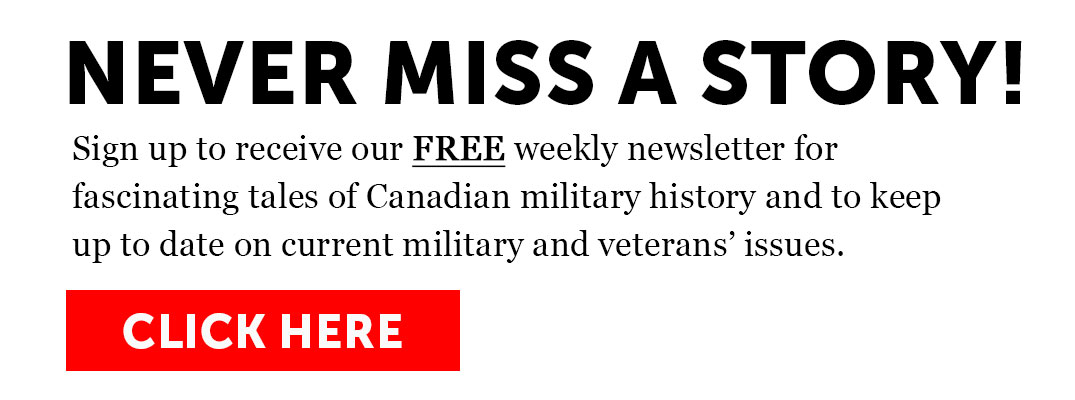It was September 2006 and Operation Medusa had just opened with what Mitch Potter of the Toronto Star described as “a perfect Taliban ambush of unprecedented intensity.”
Blair, an armoured reconnaissance trooper, called it one of “the most impactful” events of his life. It would not be the last.
“I could see five guys trying to come around to flank Charles Company,” he told a recent workshop at Project Trauma Support in Perth, Ont., where he now mentors PTSD victims like himself. “At the time, I was 100 per cent positive with target identification…and I engaged them.
“The sight system I was on was phenomenal; I could see the bullets laying, so I knew exactly what was going on, what I was doing. I saw that I’d killed three of them instantly. The other two dropped, I hit them [and] they managed to crawl into a little hut, but that hut wasn’t there much longer.
“I knew they didn’t make it either.”
Soon after, a call came in for smoke to mark the Canadians’ front line. There are only two reasons to call for smoke on the front line of a battlefield: to define the combat zone for air support or due to friendly fire.
Suddenly, Blair was gripped by doubt about what he had just done. Could those have been allied fighters he had just killed? “I was terrified that I’d just shot five of our guys.”
He waited what seemed like an eternity for the marker. When it finally came, it was where he thought it should have been. His aim had been true.
“But that feeling that I had done something horrible, it was still there, regardless of the fact that I hadn’t,” he said. “That feeling…stayed with me for years.”
It was one of five critical incidents—including a friendly-fire attack that killed three of his brothers-in-arms the following day—that interrupted a 21-year military career and ultimately brought Blair to Project Trauma Support.
The six-day residential program is held at Tay River Reflections Medical Spa, located on the site of a former equestrian centre.
The program, which just received a pledge for $300,000 in support over three years from Dominion Command of The Royal Canadian Legion, is the brainchild of Manuela Joannou, a longtime family physician and emergency medicine specialist.
“PTSD, as it is defined and diagnosed, is only a small piece of this injury,” Joannou said. “I recognize that very often it is an injury to your heart and soul; it is a moral injury.”
The two have different symptoms and treatments.
“The moral injury component, you can’t medicate,” she said. “You can’t heal a broken heart with medication. You can’t even quantify it with the research methods that we’re using…. You can’t see a soul on an MRI.”
Joannou says that until health-care professionals widen their arcs of fire and address the whole injury and the entire person, “I don’t think we’re going to make as much of a difference in treating operational stress injuries as we’d like to think we are.”
Her physician-led, peer-driven program emphasizes human connections, helping clients navigate their way out of the woods alongside others who are facing similar experiences and challenges.
“We really believe that you cannot heal from moral injury alone. Medication doesn’t work. You heal in communities; you heal in the understanding, the compassion, the knowledge, the validation that comes from sitting next to somebody who’s been there, who can say ‘yeah, I sure get it.’”
More than just sitting and talking, Project Trauma Support includes fitness and physical activities.
“They also need to do things that reconnect up to something greater than ourselves, which is how we address the spiritual, soul component. We’re not at all religious; we don’t follow any religion nor any spiritual thought process, but we present different points of view—we point out pertinent features in the landscape of their journey that they may not have appreciated or given priority to.
“We’re just tour guides.”
Joannou has treated 289 participants in 29 cohorts over the past three years, with what experts have described as impressive results.
Raymond McInnis, a retired chief warrant officer and the Legion’s veterans’ services director, said the decision was made to make one of the service organization’s largest-ever donations after an exhaustive assessment of the program’s methods and results. “It’s money well spent,” said McInnis.
The program has already been subject to some clinical study.

Project Trauma Support’s facility at Tay River Reflections Medical Spa in Perth, Ont. [Project Trauma Support]
She used so-called K-6 standards set by the World Health Organization in its World Mental Health Survey to measure psychological distress in her subjects and found improvement across all its subdomains as well as in eight of 10 subdomains in her Life Challenge Survey (LCS). The latter measures specific problem areas made more complicated by stress such as finances, relationships, sleep, nutrition, coping and substance use.
“All participants demonstrated K6 scores above threshold for severe psychological distress upon entry to the program, consistent with substantial symptomology related to PTSD,” wrote Dentry.
“After completion of the program, half of the group had K6 scores below the severe distress threshold, all but one of the participants had reductions in their K6 scores, and all but one had reductions in the LCS overall scores.
“These findings are impressive, and demonstrate that the participant receptivity to the program was very high.”
She cautioned that there were limitations to her work—specifically, it used a relatively small sample size with one specific occupational background; seven of 23 participants did not complete the survey, which could have skewed the results; and the potential impact of socio-demographic factors, such as family structure, gender and employment status is unknown.
Nevertheless, “Project Trauma Support has developed a novel residential, experiential program that shows promise in alleviating the symptoms and disability caused by PTSD in first responders and military personnel,” she wrote, citing its short duration as cost-effective and minimally intrusive on family life.
“Further studies are needed to investigate long term outcomes and applicability to more diverse groups.”
Now Suzette Brémault-Phillips, a mental-health specialist from University of Alberta, is doing just that, conducting two studies—one sponsored by Veterans Affairs Canada and the other by the Canadian Institute for Military and Veteran Health Research along with the True Patriot Love Foundation.
Brémault-Phillips, an associate professor and director of Heroes in Mind Advocacy and Research Consortium, is assessing the program’s methods and its immediate and long-term effects on 96 clients.
A key component of her work is currently serving military members, whom the program aims to send back to work. But serving military are not eligible for funding under federal rules that restrict government-funded treatment to programs that the Department of National Defence health-care system cannot provide.
It’s a Catch-22. Project Trauma Support is not yet certified. To be certified, it needs studies that include people who are not funded. The Legion money will enable Project Trauma Support to bring in currently serving members and help Brémault-Phillips complete her work.
“So many people have reached out to us,” said Joannou, “It has been very difficult for me, as a physician, when I know someone’s really struggling and I believe I might be able to help them and we have no funds to bring them.
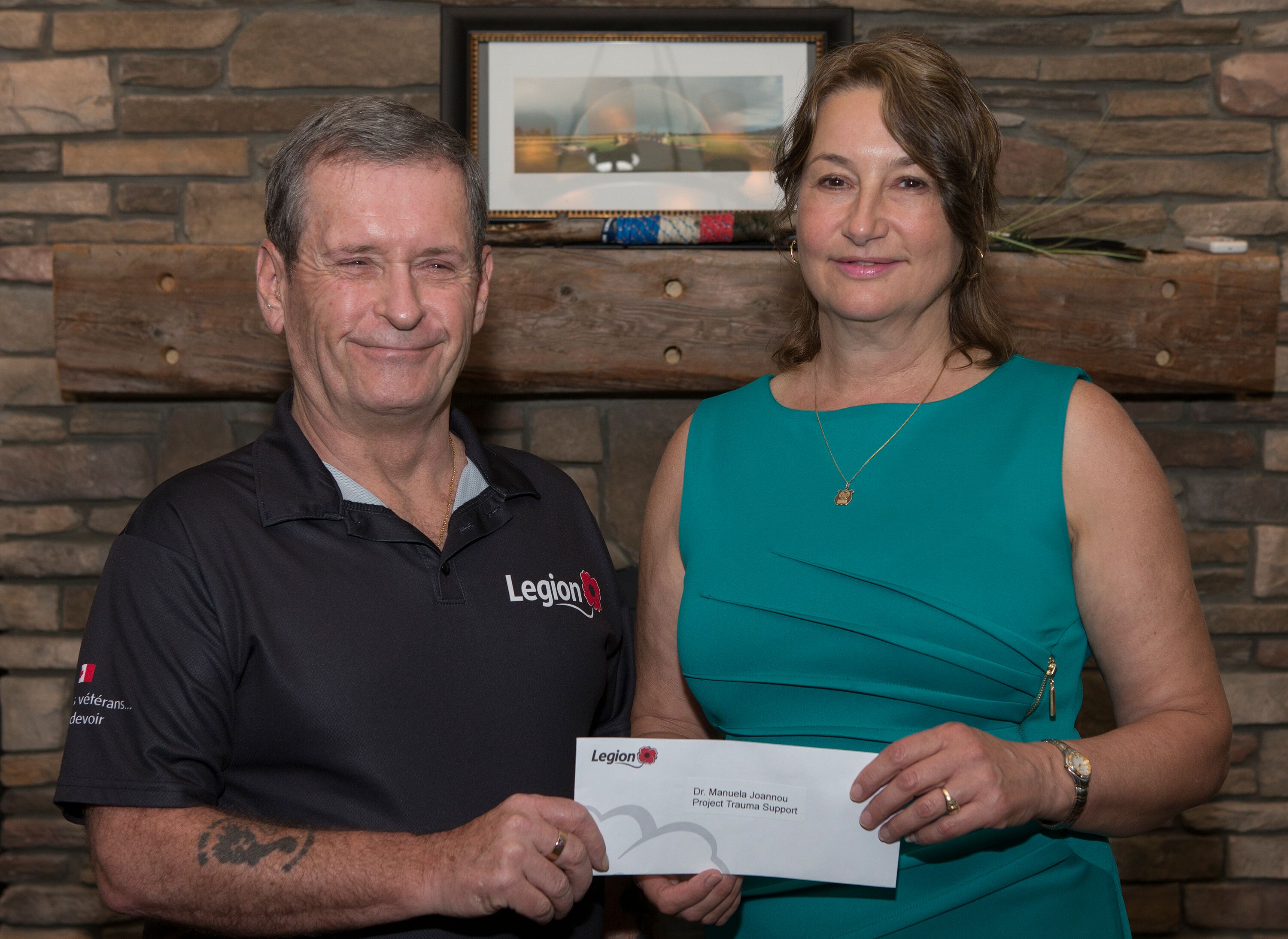
Royal Canadian Legion President Tom Irvine presents a cheque to Manuela Joannou. [Stephen J. Thorne]
Brémault-Phillips, a medical rehabilitationist and occupational therapist by trade, says, “the jury’s still out” on the program. “We need to look at many things that don’t cause harm, that help, and that have evidence behind them to be able to be supported confidently by different organizations.”
Meanwhile, the therapy, she emphasized, must come first and the research second—tempered to accommodate the sensitivities of the program. A randomized control trial, where one group receives treatment and another does not, is out of the question. “It would be unethical.”
She praised Joannou for her openness and willingness to invite critical and objective research into Project Trauma Support.
McInnis says it’s the Legion’s hope that by the time the poppy fund money is spent, sufficient research will exist “to establish credibility with both VAC and the military,” compelling them to take on funding responsibilities.
“Because if you can get someone to go back to the line of duty instead of sick leave, why wouldn’t you pay for that?” McInnis said. “And we’re not talking a lot of money here when you look at the amount that has been expended over the years on counselling, treatment and medication compared to a six-day session.”
The testimonials McInnis has seen have been impressive, he said. Some program alumni said it saved their lives. Staff told Legion representatives the money, to be allocated in $100,000 increments after annual reviews, would save more.“I thought I was pretty smart or at least knowledgeable about PTSD, after all I’ve been dealing with it for nearly 25 years and had attended several courses and workshops,” said Brian Cameron, a retired major who attended the program’s Cohort 21 thanks to a grant from the British Columbia/Yukon Command of the RCL.
“The unique approach taken during the week allowed me to experience a huge perception change. For the first time, I realized that I was never going to be what I was before, but that was OK because I had accomplished some wonderful things and have personally impacted thousands of individuals—because of my PTSD and not despite it. I was living proof that I was actually better now than I was before.
“For the first time in 25 years, I realized I didn’t have to fight PTSD, I should embrace it because I am the person I am because of PTSD. That perception change lifted a huge load of guilt off my shoulders.”
Cameron said all eight members of his cohort made “incredible breakthroughs.”
So did Blair who, after years living in denial of his PTSD, began realizing that everything was not his fault.
Blair traces his road to recovery back to a conversation he had with Lieutenant-Colonel Markus Besemann, an award-winning military doctor who accompanied him and other wounded warriors on a 2016 Antarctic expedition. Besemann is part of the Project Trauma Support program.
“So Markus,” Blair asked him, “am I fucked up?”
“As a true officer, he did not answer my question,” Blair told program participants. “But what he did say changed my life. He replied: ‘The question is, Jeremy, how do we turn PTSD into post-traumatic growth?’”
It was the first time someone with authority had told Blair he had PTSD. But more important to Blair was the fact the doctor told him he could change his own trajectory and turn it into something positive.
“He said we can change post-traumatic stress into post-traumatic growth. That let me know that I was a player in this game; I had some sort of stake in what goes on.”
Blair, a veteran of five overseas tours, attended Project Trauma Support and has not looked back. He has mentored program participants and spoken often about his experience. He says he continues peeling away layers of understanding.
“I knew what I was doing when I pulled that trigger; I made that choice,” he said, reflecting on the firefight in which he killed the five insurgents. “But the reality is, those five individuals made numerous choices well before I showed up…that put them in that position.
“They were trying to kill my friends. This was my job. I was legally and morally justified in what I did. So I started to let go of that responsibility for it.”
Joannou said Blair’s story “exemplifies so beautifully how you go from post-traumatic stress to post-traumatic growth.”
“You do the processing, you put everything in perspective, you apply a new template—a new way of thinking with new insights—and then you realize you can live with what happened and have peace, and you can go forth with purpose.”
Advertisement









